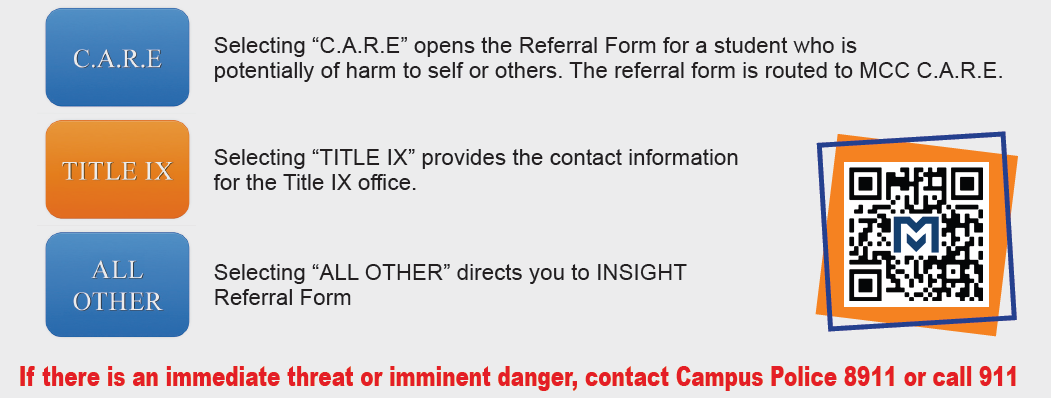Faculty/Staff Referrals

A student may not necessarily express a mental health need. Tardiness or excessive absences, alcohol or drug abuse, sudden or extreme changes in behavior, marked changes in personal hygiene/weight, disclosure of sexual assault/harassment/relationship violence, and disclosure of suicidal thoughts or irrational thoughts are often indicators of problems that warrant a referral.
In all situations, follow the steps below to connect the student to the appropriate resource.
- Talk to the student privately about specific behaviors that are concerning. Listen to the student and express care and concern for his/her well-being.
- When making a referral, notify the student that you will be referring them, provide information about the service offered, the purpose of the referral, and encourage them to engage with the referral resource.
- Refer the student to the appropriate resource as defined below. Click on the image below to begin your referral or visit www.mclennan.edu/refer
The following guide will assist you in identifying concerns that may warrant connection to the MCC Student Counseling Center:
When ...
- Listen compassionately.
- Encourage the student to contact the MCC Student Counseling Center through email (counseling@mclennan.edu), phone (299-8210) or by visiting the center at the Math & Wellness building, Room 225B.
- Follow up with the student at the next available class meeting.
- Contact the Student Counseling Center to let us know you will be escorting the student to the center.
- OR if the student refuses to be escorted, you have the option of requesting that a counselor come to your office by calling the center at ext. 8210.
- If the student mentions thoughts or behaviors of self-injury, suicide, or harm to others also refer the student to C.A.R.E.
- Contact Campus Police at extension 8911 or off-campus police at 911.
- Stress or anxiety
- Sadness or depression
- Feeling overwhelmed by school, work, and/or family responsibilities
- Having difficulty adjusting to recent change
- Struggling to make decisions or being unsure of the future
- Loneliness or isolation from others
- Relationship issues
- loss and/or grief
- Sleep problems
- Alcohol/drug use
- Eating disorders
- Crisis
- Trauma - recent or past
- Thoughts of harm to self or others
- Concerns about their ability to keep themselves safe from harm
- Communicating a current plan to attempt suicide
- Recently taking steps to commit suicide
- Exhibiting a strong desire to physically hurt or harm someone else
- Experiencing sexual assault/harassment/relationship violence
- Hearing voices or seeing things other people do not
- Experiencing emotional distress which prevent them the ability to meet daily responsibilities
Confidentiality & Autonomy
Due to federal law and ethical standards, mental health providers at the Student Counseling Center are not permitted to initiate contact or solicit students for services. In accordance with the principles of autonomy and self-determination, it is necessary for students to initiate contact with the Student Counseling Center themselves.
Additionally, because of our strict confidentiality policies, we are unable to confirm or deny whether a specific student is receiving services thought the Student Counseling Center.
- MCC Campus Police (Available 24/7 for urgent or in-progress concerns): 254-299-8911
-
MCC C.A.R.E. (for concerns of harm-to-self or others): See referral steps above
If you have further questions or would like to discuss how we can support you in navigating certain situations, please reach out the MCC Student Counseling Center office.
Math & Wellness building, Room 225B
Office Hours: Monday - Friday, 8:00 a.m. - 5:00 p.m.counseling@mclennan.edu
(254) 299-8210


